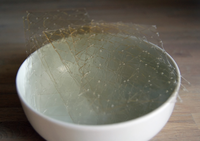
Photo from wikipedia
Degradable polymers are limited by their often-insufficient mechanical and thermal properties, which limit their usage to single-use packaging items at room temperature and in dry conditions. In this respect, the… Click to show full abstract
Degradable polymers are limited by their often-insufficient mechanical and thermal properties, which limit their usage to single-use packaging items at room temperature and in dry conditions. In this respect, the present work deals with the manufacture of custom-built Poly Lactic Acids (PLAs), which are designed to be compostable, suitable for food contact and are characterized by a good compromise between mechanical properties and thermal stability. A commercial grade PLA was, therefore, compounded in a twin-screw co-rotating extruder by the use of specific additives: maleated and glycidyl methacrylate PLAs as compatibilizers/chain extenders and microlamellar talc as mineral filler/nucleation promoter. After pelletizing, the resulting compounds were melt-processed by injection and compression molding. Differential scanning calorimetry, flexural tests in static machine and top-hat cylindrical flat indentations were performed to evaluate the thermal and mechanical response of the molded components. The experimental findings show that crystallization of the PLA can be controlled by fine-tuning the compound formulation as well as by properly setting the processing parameters. In addition, achievement of the appropriate crystallization degree in the polymer can lead to molded components, which exhibit improved mechanical strength and high thermal stability.
Journal Title: Advances in Polymer Technology
Year Published: 2018
Link to full text (if available)
Share on Social Media: Sign Up to like & get
recommendations!